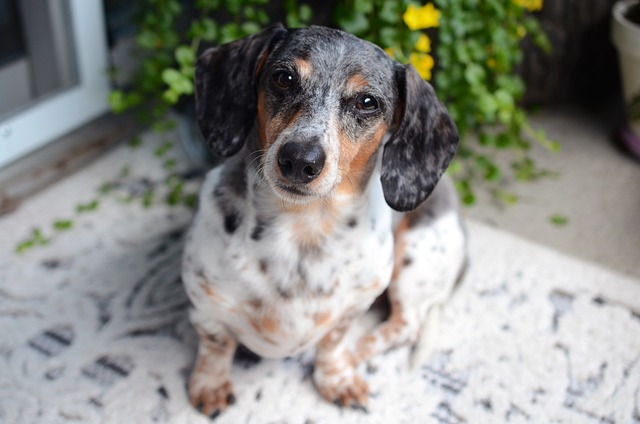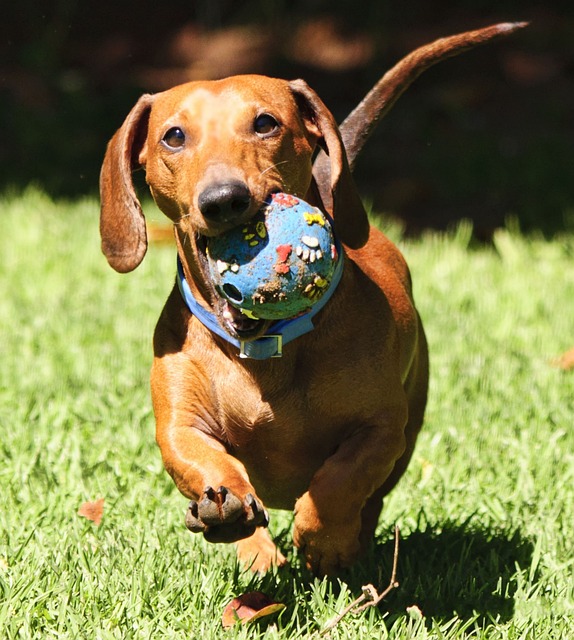What is an average Dachshund weight, and what can you do to keep it on the right track? This is probably one of the most common questions we hear from dog owners.
The first thing that we must mention is that our little Weiner doggies can come in different varieties, including standard, miniature, and rabbit dachshund, each with its own characteristics and weight standards. Maintaining a healthy weight is crucial for the overall well-being and quality of life of Dachshunds. So, let’s see what is the ideal weight range for dachshunds and what we can do to keep them healthy!

How much should a dachshund weigh?
When it comes to determining the ideal weight for a dachshund, there are several factors you should consider. Adult dachshunds generally fall into three size categories: standard, miniature, and rabbit tackle.
- The standard variety typically weighs between 16 and 32 pounds.
- If you have a miniature Dachshund, the weight range will be slightly different. Miniature Dachshunds usually weigh between 11 to 16 pounds (5 to 7.3 kilograms).
- Rabbit dachshunds are the smallest and usually weigh less than 11 pounds.
Still, you should always keep in mind that every dog is unique, and factors such as age, genetics, and activity level can influence the ideal weight.
The best way to know how much weight your doxie should have is to consult with your veterinarian!
What can affect the dachshund’s weight?
When it comes to weight, we know that it can vary and change depending on lots of factors. When you think about it, it is not very different from human weight variations. Here are some factors that can affect the weight of the dachshunds:
Dachshund weight – Age and Developmental Stages
Dachshunds, like all dogs, go through various developmental stages, and that can have quite an impact on their weight. Dachshund puppies, for example, need a regular and balanced diet to have a healthy weight and good development.
For a young dachshund, you should keep in mind that the diet must contain enough protein and carbs as well as healthy fats and vitamins. You need to manage the quantity and quality of your Dachshund’s diet! As they mature, their weight should stabilize within the breed’s standard range. Still, in their older age, Doxies may have some digestive problems that can affect their eating routines, and they may become a bit overweight.
Dachshund Weight: The Influence of Diet and Nutrition
The food your Dachshund eats plays a significant role in their weight management. Try to avoid foods that are full of additives. Dachshunds are also prone to allergies, and food allergies are pretty common. The nutrition that Dachshunds need is best gained from healthy meat like beef, some veggies like peas and carrots, and some healthy fats. Doxies can eat eggs and love them, but in that meal, they shouldn’t eat meat. If you are not sure what food is the best for your dachshund, or maybe you are thinking about a raw food diet – check it all with your veterinarian first!
Exercise and Activity Levels
Regular exercise is essential for maintaining a healthy weight in Dachshunds. These playful little pups enjoy walks, playtime, and mental stimulation. Some of the exercises that your dachshund will love include running, digging, and agility training. They are quite good at obstacles and problem-solving games and training, plus this is a great way to maintain a healthy weight!
However, it’s important to consider their unique build and avoid activities that may strain their backs or joints.
Genetics and Breed Characteristics
Genetics can influence a Dachshund’s weight. That means that some Doxies may have the predisposition for obesity in their DNA code, while others may struggle to maintain weight. Understanding your Dachshund’s genetic background can help you better manage their weight, and you will know if you should watch out for obesity or underweight.
How to know if my Dachshund is underweight?
Dachshunds can easily become underweight since they are a smaller dog breed and can easily lose weight (just like gaining them). That is why an underweight dachshund is a real concern! Signs of underweight Dachshunds may include visible ribs, a lack of muscle tone, and a generally thin appearance.
Underweight Dachshunds may be more prone to illnesses, have a weakened immune system, and lack the energy required for an active lifestyle. If you notice your Dachshund is underweight, it’s important to consult with your veterinarian. They can help identify the root cause and provide some diet changes, nutritional supplements, and any necessary medical interventions to help your Dachshund reach a healthy weight.

How to know if my Dachshund is overweight?
Is your dachshund looking a bit more round than usual? It’s important to be able to identify signs of overweight in your furry friend. An overweight dachshund may have difficulty moving or walking, struggle with breathing, or display a lack of energy. You might also notice that their ribs are not easily felt when you run your hands along their sides.
These are the top 3 signs that will reveal you if your Doxie is fat.
1. The Rib Test
One of the simplest methods to gauge your Dachshund’s weight is the rib test. Gently run your hands along your dog’s side. You should be able to feel the outline of their ribs without pressing too hard. The ribs shouldn’t be visibly protruding, but they also shouldn’t be buried under a thick layer of fat. If you’re pressing down and still can’t discern the ribcage, it’s time to consider a weight check.
2. Observe Their Waistline
Just like humans, a visible waistline is a sign of a healthy weight for dogs. View your Dachshund from above and look for a slight indentation after the ribcage, before the hips. This defines their waist. If this indentation is absent, or worse, if the area appears rounded or straight, it could mean that your Dachshund has put on some extra pounds.
3. Monitor Energy Levels
An overweight Dachshund might not be as playful or active as they usually are. They might tire easily during walks or seem lethargic more often than not. Remember, carrying excess weight can be taxing on their small frame and can lead to numerous health issues, including joint pain. If you find your Dachshund avoiding playtime or struggling to keep up during walks, it might be a sign of them being overweight.
While those extra pounds might seem harmless, even cute to some people, they can actually lead to serious health risks for your dachshund. Obesity in dachshunds can increase the risks of developing diabetes, joint problems, heart disease, and so much more.
Don’t worry, there are ways to help your dachshund shed those extra pounds. The first step is to consult with your veterinarian and find the ideal diet plan and how many pounds should the doggo lose. The next step is regular exercise and a new routine that you and your dachshund should do on a daily basis! With these few steps, your rounded furry friend will be sleek, handsome, and, most importantly, healthy in no time!

Dachshund Weight: Wrapping Up
Maintaining a healthy weight for your dachshund is crucial for their overall well-being. By being aware of the signs for overweight or underweight dogs and understanding the potential health issues and risks, you can help them live a long and happy life. Remember, it’s all about finding the right balance – neither too thin nor too plump – to ensure your dachshund is in tip-top shape.
